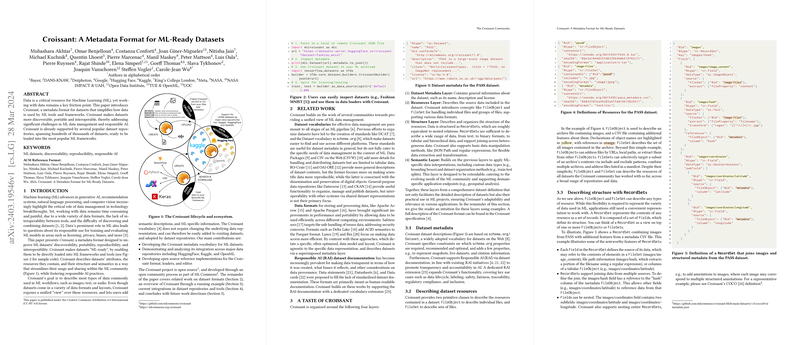Introducing Croissant: A Comprehensive Metadata Standard for ML-Ready Datasets
Overview of Croissant
The increasing complexity of ML applications necessitates a standardized approach to data management. Recognizing this need, the recent introduction of Croissant—a metadata format tailored for datasets—marks a significant step towards optimizing how data is utilized within ML tools and frameworks. Croissant aims to enhance dataset discoverability, portability, reproducibility, and interoperability. Its development was driven by a collective effort within the ML community to address prevalent challenges associated with managing ML datasets, thereby fostering a conducive environment for advancing responsible AI practices. Notably, Croissant has garnered support from prominent dataset repositories, encompassing hundreds of thousands of datasets ready for integration into widely used ML frameworks.
Key Contributions
The Croissant project advances in three primary areas:
- Development of the Croissant metadata vocabulary: This vocabulary is designed to make ML datasets more accessible and usable, providing a standardized way to describe datasets' attributes and their structure.
- Integration with major data repositories: Croissant's metadata format has been successfully integrated with several leading dataset repositories, including HuggingFace, Kaggle, and OpenML. This integration demonstrates the format's versatility and its potential to make a wide variety of datasets more ML-ready.
- Open-source reference implementations: The Croissant format, along with loaders and editors, is available as an open-source project. This availability is crucial for fostering community participation and further development.
Layers of Croissant
Croissant's structure is meticulously designed across four layers, ensuring comprehensive coverage of the necessary dataset descriptors for ML:
- Dataset Metadata Layer: Provides general information, such as dataset name, description, and license.
- Resources Layer: Describes the source data in the dataset, incorporating concepts like FileObject and FileSet for managing files and groups of files.
- Structure Layer: Outlines the organization of dataset resources, including the description of RecordSets for structured data representation.
- Semantic Layer: Facilitates ML-specific interpretations of data, introducing custom data types and dataset organization methods.
Practical Implications and Theoretical Contributions
Croissant's integration into popular data repositories demonstrates its practical utility in making datasets readily usable within ML workflows. Its layered structure allows for the detailed description of datasets, significantly reducing the effort required to prepare data for ML applications. Furthermore, Croissant encourages responsible AI by incorporating mechanisms to document datasets in line with ethical guidelines and standards.
From a theoretical viewpoint, Croissant contributes to the standardization of dataset metadata in the field of ML. Its design principle, anchored in enhancing interoperability and usability of datasets, lays a foundation for future research on efficient data management and dataset sharing within the ML community. Given its alignment with responsible AI practices, Croissant also provides a framework for considering ethical implications in dataset usage.
Future Directions in AI and ML
Looking ahead, the Croissant project aims to expand its reach and functionality. Key areas for future development include further adoption and integration within ML tools and frameworks, enhancement of ML-specific metadata features based on community feedback, and exploration of Crosissant’s applicability beyond ML, into domains requiring standardized data management practices. The project's open-source nature and community-driven approach are instrumental in achieving these goals, inviting contributions from dataset repositories, tool developers, and researchers.
The introduction of Croissant thus sets the stage for a more standardized, responsible, and efficient handling of datasets in ML, promising to accelerate innovation and ensure the ethical use of data in AI applications.
